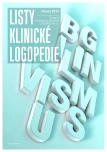-
Medical journals
- Career
Primary language impairment in a context of multilingual society
Published in: Listy klinické logopedie 2017; 1(1): 34-38
Category: Main topic
Overview
In European countries there is an increasing number of children who speak more than one language before entering elementary school. At the same time, often a level of proficiency in the country’s langauge is not good enough. The worse level of the language proficiency in which the children will be educated later can be viewed at a first glance as a clinical language symptom of children with primary language impairment or language impairment. Due to this overlapping in the language of multilingual children during an assessment, this can lead a specialist to a misleading diagnosis. Very often, these bilingual children are labeled as children with primary language impairment. Because of this very real situation, a unique European project started running under the European Science Foundation (ESF). The main aim within the frame of this project was to try unify diagnostic criteria for speech and language diagnosis processes of bilingual children with primary language impairment. At the same time, to also try to find diagnostic tools which will be more sensitive in language assessment, as well as the evaluation of bilingual children. In the four working groups, tasks were created for narrative assessment, phonological processess and verbal memory, vocabulary and executive functions. The project also created the proposal of a questionnaire for mapping the bilingual situation in a family. From the final report it is clear that bilingual children with primary language imapirment have language difficulties in both languages. Bilingual children with language impairment also show a similar level of impairment compared to the language impaired monolingual children.
Key words
bilinguism, Primary language impairment, language impairment, crosslinguistics lexical task, narative, ISO 804 COST project
Sources
- ARMON-LOTEM, Sharon, Jan DE JONG a Natalia MEIR. Assessing Multilingual Children: Disentangling Bilingualism from Language Impairment. Toronto: Multilingual Matters, 2015. ISBN 978-1-78309-311-3.
-
BIALISTOK, Ellen. Bilingualism in Development. Language, Literacy, & Cognition. Cambridge: Cambridge University Press, 2001. ISBN 0-521-63507-1.
-
BOTTING, Nicola. Narrative as a tool for the assessment of linguistic and pragmatic impairments. Child Language Teaching and Therapy. 2002, 18(1), 1 - 21.
-
GAGARINA, Natalia, Daleen KLOP, Sari KUNNARI, Koula TANTELE, Taina VÄLIMAA, Ingrida BALČIUNIENE, Ute BOHNACKER a Joel WALTERS. Assessment of Narrative Abilities in Bilingual Children. In: ARMON - LOTEM, Sharon, Jan DE JONG a Natalia MEIR. Assessing Multilingual Children: Disentangling Bilingualism from Language Impairment.. Toronto: Multilingual matters, 2015, 243 - 276. ISBN 978-1-78309-311-3.
-
GENESEE, Fred a Elena NICOLADIS. Bilingual First Language Acquisition. In: Blackwell Handbook of Language Development. Malden: Blackwell Publishing, 2009, 324 - 342. ISBN 978-1-4051-9459-4.
-
HAMAN, Ewa, Magdalena ŁUNIEWSKA, Pernille HANSEN, et al. Noun and verb knowledge in monolingual preschool children across 17 languages: Data from cross-linguistic lexical tasks (LITMUS-CLT). Clinical Linguistics & Phonetics. 2017. DOI: 10.1080/02699206.2017.1308553.
-
KAPALKOVÁ, Svetlana. Bilingvizmus a vývin jazykových schopností detí v ranom veku. In: Logopedická propedeutika. Bratislava: Univerzita Komenského v Bratislave, 2016, 129 - 145. ISBN 978-80-223-4164-6.
-
KAPALKOVÁ, Svetlana a Lucia PALUGYAYOVÁ. Narušená komunikačná schopnosť v multilingválnej spoločnosti. In: KEREKRÉTIOVÁ, Aurélia. Logopédia. Bratislava: Komenského Univerzita v Bratislave, 2016, 36 - 56. ISBN 978-80-223-4165-3.
-
KAPALKOVÁ, Svetlana, Kamila POLIŠENSKÁ, Lenka MARKOVÁ a James FENTON. Narrative abilities in early successive bilingual Slovak–English children: A cross-language comparison. Applied Psycholinguistics. 2016, 37(1), 145-164.
-
KAPALKOVÁ, Svetlana a Daniela SLANČOVÁ. The vocabulary profile of Slovak children with primary language impairment compared to typically developing Slovak children measured by LITMUS-CLT. Clinical Linguistics & Phonetics. 2017. DOI: 10.1080/02699206.2017.1308016.
-
KAPALKOVÁ, Svetlana, Daniela SLANČOVÁ, Iveta BÓNOVÁ, Jana KESSELOVÁ a Marína MIKULAJOVÁ. Hodnotenie komunikačných schopností detí v ranom veku. Bratislava: Slovenská Asociácia Logopédov, 2010. ISBN 978-80-89113-83-5.
-
ŁUNIEWSKA, Magdalena, Ewa HAMAN, Sharon ARMON-LOTEM, et al. Ratings of age of acquisition of 299 words across 25 Languages. Is there a cross-linguistic order of words? Behavior Research Methods. 2016, 48(3), 1154 - 1177. ISSN 1554-351X.
-
PARADIS, Johanne. Second Language Acquisition in Childhood. HOFF, Erika a Marilyn SHATZ. Blackwell Handbook of Language Development. Firs published. Malden: Blackwell Publihing, 2009, 387 - 406. ISBN 978-1-4051-9459-4.
-
PAUL, Rhea a Courtenay NORBURY. Language Disorders from Infancy through Adolescence: Listening, Speaking, Reading, Writing, and Communicating. 4th. London: Elsevier, 2012. ISBN 978-0-323-07184-0.
-
POLIŠENSKÁ, Kamila a Svetlana KAPALKOVÁ. Improving Child Compliance on a Computer-Administered Nonword Repetition Task. Journal of Speech, Language, and Hearing Research. 2014, 57(June), 1060 - 1068.
-
SAMKO, Milan a Svetlana KAPALKOVÁ. Analýza naratívnej schopnosti rómskeho dieťaťa v rómčine a slovenčine. Psychológia a patopsychológia dieťaťa. 2014, 48(3 - 4), 372 - 384.
-
SLANČOVÁ, Daniela a Svetlana KAPALKOVÁ. Výskum vývinu detskej reči v slovenčine v medzinárodnom kontexte projektov COST. Jazyk a Kultúra [online]. 2013, 4(14), 1 - 9 [cit. 2017-04-30]. DOI: file:///C:/Users/X3/AppData/Local/Temp/slancova_kapalkova-1.pd.
-
ŠTEFÁNIK, Jozef. Teoretické aspekty individuálnej dvojjazyčnosti. In: Logopeadica X. Bratislava: Liečreh Gúth, 2007, 9 - 28.
Labels
Clinical speech therapy General practitioner for children and adolescents
Article was published inClinical speech therapy (Listy klinické logopedie)

2017 Issue 1-
All articles in this issue
- Bilingualism and education of children in a bilingual family
- The impact of changes in multilingual environment on child‘s speech development
- Expressive vocabulary of Czech-German bilingual child
- Primary language impairment in a context of multilingual society
- Selected myths in relation to bilingualism
- A nonword repetition ability as a complement to a family history of a child
- RAISING THE LEVEL OF ATTENTION BY USING COGNIPLUS PROGRAM OF ADULT PATIENTS WITH TBI OR STROKE
- Clinical speech therapy (Listy klinické logopedie)
- Journal archive
- Current issue
- Online only
- About the journal
Most read in this issue- Bilingualism and education of children in a bilingual family
- Selected myths in relation to bilingualism
- The impact of changes in multilingual environment on child‘s speech development
- A nonword repetition ability as a complement to a family history of a child
Login#ADS_BOTTOM_SCRIPTS#Forgotten passwordEnter the email address that you registered with. We will send you instructions on how to set a new password.
- Career

